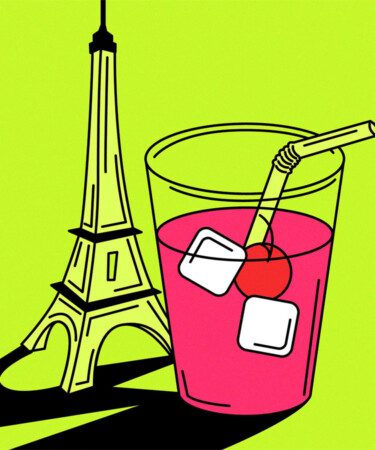After an eight-hour work day, there’s nothing quite like closing your computer, heading to your local watering hole, and enjoying a few discounted drinks with friends. That’s right, we’re talking about happy hour, that blissful period when alcohol and snacks are cheaper and the sun has barely set.
While you may save a few dollars on Margaritas, brews, or olives, non-alcoholic options like soda and NA cocktails usually aren’t included on U.S. establishments’ discounted menus. But in France, where happy hours — or apéro hours — are just as popular as their American counterparts, bars are actually forbidden from discounting alcoholic beverages without also offering a deal on zero-proof drinks.
This law was included in new anti-drinking legislation enacted by the French government in 2019. While France is relatively low-ranking among European countries in terms of annual alcohol consumption, the legislation was spurred by what France’s national public health ministry called “an alarming increase” in binge drinking, especially in younger generations.
To crack down on the potential overconsumption happy hours can welcome, the ministry now forbids bars “from offering any reduced priced alcoholic drinks for limited times without also offering cheaper non-alcoholic drinks during the same period.” Additionally, establishments must provide a snack like peanuts, chips, or popcorn free of charge for guests. The legislation is based on the assumption that the better deals on alcoholic beverages were pushing consumers to just choose booze rather than a full-price NA option.
In addition to the happy hour legislation, the French ministry also mandated that shopkeepers and bar owners now ask for I.D. when making alcohol sales, whereas prior to 2019, this was only advised. France’s legal drinking age is 18, though the legislation outlaws anyone under the age of 16 from entering establishments selling alcohol unless accompanied by an adult.
While the true impact of the 2019 legislation is yet to be seen, early signs indicate that it has been successful in diminishing alcohol consumption among young people. In December 2022, a Health Behavior in School Aged Children (HBSC) study reported that while alcohol remains the highest-consumed illicit substance used by French children, the number of students reporting that they have consumed alcohol is the lowest it has been since 2010. Moreover, the number of 9th-grade students reporting that they had never consumed alcohol doubled in the past decade, an accomplishment that Dr. Emmanuelle Godeau, a lead investigator on the survey, says is due to France’s new campaigns and targeted policies.
